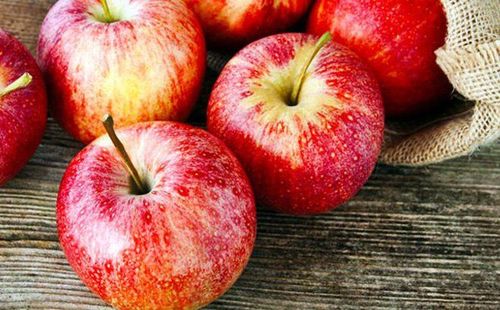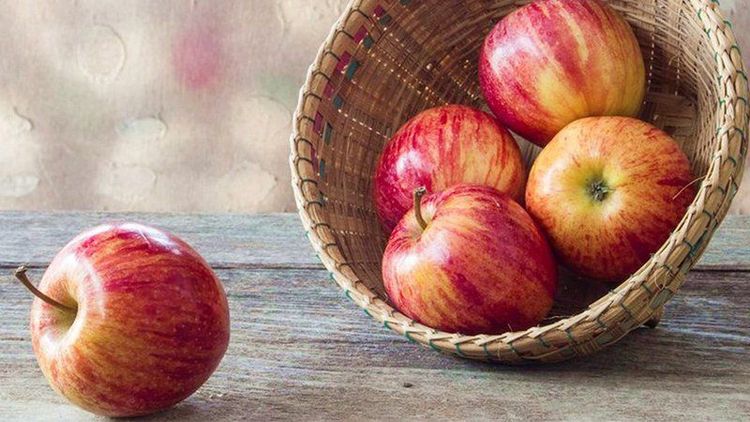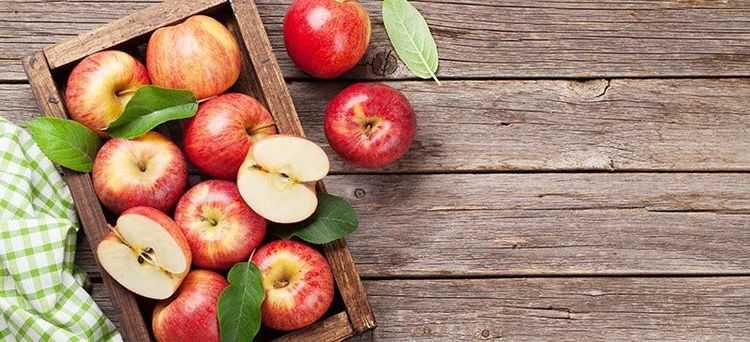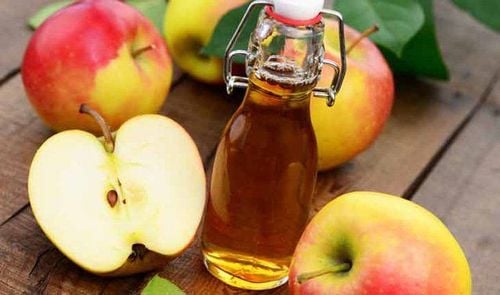This is an automatically translated article.
Many people wonder if eating apples is good for health? How to eat apples effectively? Although the nutrition labels do not list the nutritional compounds, eating apples has many health benefits. In this article, we will provide useful information for you to better understand the effects of apples and your health.1. Nutritional sources from apples
It is no exaggeration that scientists call apples a "super fruit" because of their nutrients. Specific ingredients of some typical types are as follows:| Chất dinh dưỡng | Số lượng trong 1 quả táo | Yêu cầu hàng ngày của người lớn |
| Năng lượng ( calo ) | 94,6 | 1.800–3.000 |
| Carbohydrate (g) | 25,1, bao gồm 18,9 g đường | 130 |
| Chất xơ(g) | 4.4 | 22,4–33,6 |
| Canxi (miligam [mg]) | 10,9 | 1.000–1.300 |
| Phốt pho (mg) | 20 | 700 |
| Magiê (mg) | 9.1 | 320–420 |
| Kali (mg) | 195 | 4.700 |
| Vitamin C (mg) | 8,37 | 75–90 |
| Folate (microgram [mcg]) | 5,46 | 400 |
| Choline | 6.19 | 425–550 |
| Beta-carotene (mcg) | 49.1 | Không có dữ liệu |
| Lutein và zeaxanthin (mcg) | 52,8 | Không có dữ liệu |
| Vitamin K (mcg) | 4 | 90–120 |
1.1. Carbs in apples The main ingredients of apples are carbs and water, in addition, apples are rich in simple sugars, such as fructose, sucrose and glucose.
Despite their high carb and sugar content, their glycemic index (GI - a measure of how foods affect the rise in blood sugar levels after eating) is low, ranging from 29–44 . Due to the high fiber and polyphenol content, fruit often has a lower glycemic index of apples than other fruits.
1.2. Fiber Apples are rich in fiber, with one medium apple (100g) containing about 4 grams of fiber, which is 17% of the Daily Value (DV). Some of their fiber comes from an insoluble and soluble fiber called pectin, which is a type of soluble fiber that can help prevent constipation and lower LDL, the "bad" cholesterol. Pectin is also fermented by beneficial bacteria in the colon, producing short-chain fatty acids that may play a role in preventing chronic diseases, including certain cancers and bowel disorders
Fiber Soluble has been linked to many health benefits, in part because it feeds friendly bacteria in your gut. In addition, fiber can also help improve satiety and weight loss, while also lowering blood sugar and boosting digestive function.
1.3. Vitamins and minerals
Apples provide many vitamins and minerals, especially a rich source of vitamin C.
Vitamin C: Also known as ascorbic acid, this vitamin is a common antioxidant found in fruit. It's an essential dietary nutrient that has many important functions in your body. Potassium: The main mineral in apples, potassium can benefit heart health when consumed in large amounts. There is also beta carotene, folate, magnesium and calcium...
1.4. Other Plant Compounds Apples contain various antioxidant plant compounds that provide many important health benefits. These phytochemicals help neutralize free radicals, and if too many free radicals build up in the body, they can cause oxidative stress, and this can lead to cell damage. These lesions can contribute to a variety of diseases, including cancer and diabetes.

Táo được gọi là siêu trái cây bởi nguồn dinh dưỡng đa dạng và phong phú mà nó mang lại
Quercetin. A flavonoid, a naturally occurring phytochemical that may have anti-inflammatory, antiviral, anticancer, and antidepressant effects in Catechin animal studies. A natural antioxidant, catechins have been shown to improve brain and muscle function in animal studies Chlorogenic acid has been shown to reduce blood sugar and weight loss in a short period of time. number of studies
2. Some popular apples are loved by many people
McIntosh: A juicy, red apple with soft, white flesh and a tangy flavor. Delicious Red: A crisp, juicy red apple. Fuji: Yellow and red, firm, sweet flesh. Granny Smith: A green apple with crisp, green flesh and a sharp flavor. Delicious Golden: The golden apple has a mildly sweet taste. Envy: Red apples mixed with yellow, large, firm, sweet, and very fragrant apples.3. Health benefits of apples
3.1. Controlling blood sugar and type 2 diabetes The fiber in apples slows down digestion, preventing a rapid rise in blood sugar levels after eating. Eating apples with the skin on provides the most fiber (apple juice does not contain any fiber). An average apple has 4.4 grams of fiber, so eating an apple or two can help you reach your total daily need for sugar.The antioxidant effects of flavonoids in apples may protect cells from damage in the pancreas, an organ responsible for secreting insulin in response to extra blood sugar. An epidemiological study of 38,000 women in the US Women's Health Study followed for nearly 9 years found a beneficial relationship between apple consumption and the risk of type 2 diabetes. People who ate one or more apples a day had a 28% lower risk of developing type 2 diabetes than those who didn't.
3.2. Blood cholesterol and heart disease Animal studies have shown that phytochemicals, especially in apple peels, combined with the fiber pectin may help protect against the damaging effects of free radicals in the heart. , blood vessels and cholesterol-lowering effects. A review of five clinical trials documented the fruit's effects on cardiovascular diseases and found improvements in cardiovascular parameters (reduced triglycerides and cholesterol - LDL) when whole fresh apples were consumed. or dried apples.
One medium apple provides:
13–20% of a person's daily fiber needs 9-11% of a person's daily vitamin C needs 4% of a person's daily potassium requirement Vitamin C is one Antioxidants, along with other antioxidants, may play a role in protecting some aspects of heart health. What's more, vitamin C can also strengthen the immune system and help the body fight infections and increase resistance to disease.
Potassium helps dilate blood vessels, reducing the risk of high blood pressure and cardiovascular complications.

Ăn táo có thể giúp bạn giảm lượng cholesterol trong máu
In a meta-analysis of 41 case and research group studies, it was found that when the highest intake of apples was compared with the lowest, there was a lower risk of lung cancer in the regular apple eater. It also showed a lower risk of colorectal, breast, and gastrointestinal cancers in case-control studies but not cohort studies. Other epidemiological studies have shown a small association between higher fruit consumption and a reduced risk of cancers of the colon and upper gastrointestinal tract (eg, esophagus, mouth, larynx).
3.4. Stroke An older study from 2000 looked at how apple consumption for 28 years affected the risk of stroke in 9,208 people. Research has found that people who eat the most apples have a lower risk of thromboembolic stroke.
Many studies have proven the nutrition in apples can reduce the risk of stroke. For example, a 2017 review found that people who consume the most fiber appear to have a lower risk of cardiovascular disease, coronary heart disease, and stroke.
3.5. Nerve health and dementia In 2019, a laboratory study concluded that quercetin in apples has a neuroprotective effect, which can prevent the generation of these types of reactions. Quercetin seems to help nerve cells survive and continue to function. Therefore, apples can help prevent age-related nerve cell loss.
It's worth noting that most of the studies on this type used high doses of quercetin that are unlikely to be found in conventional food sources. Additionally, more human studies are needed before scientists can confirm that quercetin improves neurological health in humans.
3.6. Weight control The fiber in apples can slow down digestion, helping people feel more satisfied after eating. After following three large prospective study groups of 133,468 men and women for 24 years, researchers found that intake of fiber-rich fruits with low blood sugar, especially apples and pears, had associated with minimal weight gain over time. Eating low-glycemic foods tends to produce less and less blood sugar, which can reduce feelings of hunger later in life and prevent overeating.

Táo là một trong những loại trái cây giúp bạn kiểm soát cân nặng hiệu quả
4. Risks of eating apples
4.1. Toxins Apple seeds contain very low levels of cyanide. Swallowing whole apple seeds is unlikely to cause harm, but chewing and swallowing large amounts of apple seeds can be dangerous.4.2. Allergies Some people may have an allergic reaction after eating apples. If you are experiencing symptoms such as hives, swelling or difficulty breathing, you should seek medical attention immediately.
If this progresses to anaphylaxis, it can be life-threatening.
4.3. Teeth In the past, it was believed that eating apples could help remove plaque from teeth. However, studies have not found solid evidence for this. Regular brushing is more likely to have this effect.
Additionally, the acidic content of apples can contribute to plaque buildup. Therefore, people should rinse their mouth with water or brush their teeth after eating apples.
4.4. Choking hazard Young children and older adults who have difficulty swallowing may be at risk of choking when eating large pieces of apple.
5. How to store
To prolong freshness, store in the refrigerator in the drawer of the refrigerator. They will usually stay fresh for at least 1-2 months, possibly longer. Apples are a type of fruit that can continue to ripen after harvest due to the release of a gas called ethylene. Cold temperatures slow down ethylene production. Even so, apples will still release some ethylene when refrigerated and may accelerate the ripening of other products stored nearby. Store apples in their own drawer apart from other products to prevent this from happening. At room temperature apples can be stored for 1-2 weeks.Avoid washing apples until ready to use, but make sure to rinse thoroughly under running water to remove pesticides and waxes. To keep the apple slices from turning brown, lightly coat them in lemon juice to prevent oxidation.
References: medicalnewstoday.com, hsph.harvard.edu, healthline.com













